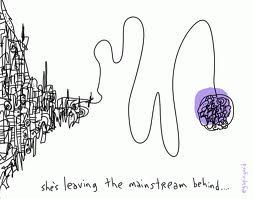by Amy Howton
(This post is cross-posted from amyjhowton.com, My Feminist Praxis)
I pretty much hate mainstream feminism. Critiques of mainstream feminisms and the movement’s pervasive reinforcement of the status quo really get me fired up. And I mean fired up–head bobbing, fist pumping, mumbling Amen and all. Here’s the problem: I’m about as mainstream as it gets. I’m white, married, middle-class, working as a professional feminist in a campus-based women’s center, I might as well get “mainstream” tattooed on my forehead.
Of course, the privilege that accompanies this mainstream status is nuanced in how I actually experience it. As I join with colleagues and students to advocate for gender and social justice in and beyond our institution, our work often times feels marginalized, dismissed, devalued. It doesn’t really feel like my work is mainstream. At all. Rather, it mostly feels that I’m working very much against the grain. Heck, most days, I feel downright radical. Sad perhaps, but true.
Nonetheless, privilege is there. It is always there. That’s how it works—usually we aren’t aware of it. Our privilege drapes us in that unknowing bliss.
I have never come up against my privilege as a mainstream, professional feminist as I have this year. As I’ve struggled to navigate politically charged waters—with much at stake in terms of our work—I’ve come dangerously close to failing to recognize my own power and privilege. At times, I attributed my feelings of sadness, frustration, anger to being disempowered when all along, my feelings reflected a truth I could hardly face: not only was I being played by the Man, I was the Man. I can honestly recall actual moments when I grappled with this hard truth, for it was much more comfortable to feel powerless than to own my power. I’m guessing I’m not alone in this; that within mainstream feminism, there is a shared jarring effect when faced with the reality that despite all good intentions, our unwavering efforts to fight the good fight, we are in many ways reproducing oppressive power structures. This is true for other social movements, as well. It’s all too easy to reproduce the very thing we’re working against.
For many of us who work on college campuses to both serve the institution and to also work to create change within it, this “revelation” is anything but. We are all too aware that we are working for the institution, that at the end of the day, the institution pays our bills. We are the institution. Nevertheless, I find that I still need reminders. When my feelings of marginalization and silencing make me feel “outside” the institution, I know it’s time to check myself.
Six years ago, I attended a National Women’s Studies Association conference session facilitated by Xenia Markowitt, then Director of the Center of Women and Gender at Dartmouth University. The session focused on the role of campus-based women’s centers in creating change. At the time, I was trying to make sense of my role, and the role of our organization in student activism on our campus calling for a new, stand-alone LGBTQ Center. I was not alone in my need to make sense of our work. The room was packed with administrators thirsty for the opportunity to reflect on our work and the tensions inherent in it. Markowitt went on to turn her session topic into an article for the Chronicle of Education entitled Is It My Job to Teach the Revolution? (Oct. 2009). The piece opens with her poignant questioning, “Will this be the day I start the revolution? Or will I be called upon again to stop it?” I’ve returned to this piece so many times during my work as a professional feminist and what I’ve come to understand is the importance of the questioning. The questioning creates space for us to be conscious of our roles and therefore, much more effective in our multi-faceted strategies to simultaneously start and stop the revolution (or, as I like to think of it, inspire and reframe).
Because of the nature of campus-based women’s centers’ work, we are particularly called to engage in the ongoing practice of reflexivity and role-clarification. Markowitt’s NWSA session was packed for a reason. Born out of the feminist movement, with common missions to create gender equity and address institutional barriers, there is an inherent tension in our work. This is true for identity centers in general. Lori Patton (2011) writes, “I suggest that identity centers can enhance their (institutional) mission by serving as spaces to disrupt privilege and address identity intersectionality.” She goes on to discuss “the contentious position of identity centers” as both symbols of commitment to diversity and scapegoats during institutional crises.” (p255). Our centers exist in the mainstream to change the tide in diversity and inclusion efforts at our institutions. It can be tough.
Much of the time, I feel empowered in my feminism to make change, effective in my work. Other times, I feel co-opted and tokenized. Sometimes, I feel actively complicit in neo-liberal, capitalistic, patriarchal systems that oppress and silence. The heart-wrenching part is realizing that most of the times—whether I recognize it or not—I am acting as all of these things simultaneously. It’s the act of remaining aware, or what Freire terms practicing “critical consciousness” that creates opportunity for transformation. I’ve been thinking a lot how to foster critical consciousness for individuals (me!), organizations (women’s centers) and communities. Mostly, I’m reassured not by the answers I find but in knowing that it is the wondering that matters.
Continuously contemplating my role and mainstream positionality allows me to see myself as both insider and outsider to the institution as I work to create change. This recognition resists the binary frameworks that drive oppression and therefore begins to undo oppressive forces. So, the best way to work against all I hate about mainstream feminism is to see, name, and embrace my own. Doing so, I believe, is a revolutionary act.
 Amy Howton is the Associate Director of the University of Cincinnati’s Women’s Center where she has served for the past eleven years. Her work experience has focused on feminist leadership and activism development, program development & evaluation, and sexual assault survivor advocacy. She has an M.A. in Women’s Studies and an EdD in Counselor Education; her action research dissertation, “Reform From Within: An Ecological Analysis of Institutionalized Feminism at our University” explored organizational change strategies.
Amy Howton is the Associate Director of the University of Cincinnati’s Women’s Center where she has served for the past eleven years. Her work experience has focused on feminist leadership and activism development, program development & evaluation, and sexual assault survivor advocacy. She has an M.A. in Women’s Studies and an EdD in Counselor Education; her action research dissertation, “Reform From Within: An Ecological Analysis of Institutionalized Feminism at our University” explored organizational change strategies.
Connect with Amy on Twitter@amyjhowton.

Amy, what a powerful and well-articulated piece of writing! Thank you for putting your thoughts to paper for us to consider and have conversations about. I’m definitely printing your commentary out. It speaks so well to what I often feel in this work, and gives me the language to express my experience to others, much like Xenia’s article has.
Jane, I couldn’t agree with you more. While I’m not working in a women’s center any more, Amy’s post resonates so much with my own experience and the balance we all hope to strike. I am so grateful to you, Jane, and to all of the other incredible people I interacted with at NWSA who understand the challenges of working in this “mainstream” (but also not) space.
Jane & Heather–Helps to know we’re not alone, doesn’t it? I share in your gratitude for our communities!
This is full of great statements that have stand alone power. For example, ” for it was much more comfortable to feel powerless than to own my power.” Really enjoyed reading this piece!